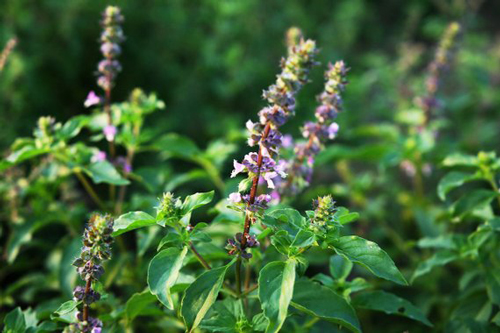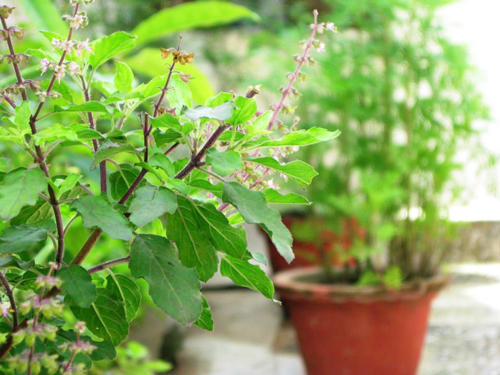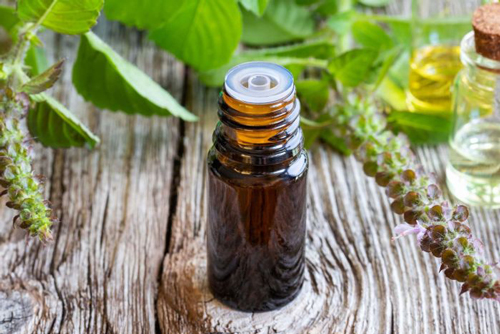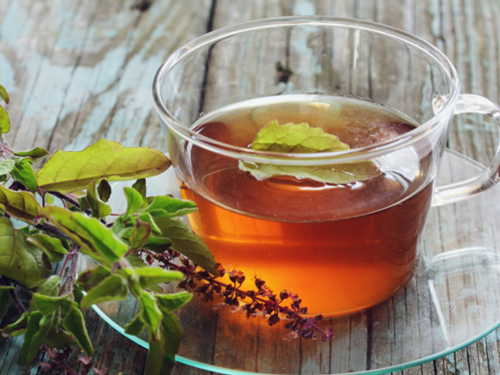Holy Basil Has 18 Amazing Medicinal Benefits
The Holy Basil herb (Ocimum sanctum), also called Tulsi, is one of the oldest and most used medicinal herbs. It has provided the backbone of many treatments among Ayurvedic physicians from thousands of years ago, as it was used to treat numerous disorders. It has also been revered for its spiritual potency, and has been dubbed among ancient Ayurvedic texts as “elixir of life.” The word Tulsi is translated to “incomparable.”

The plant grows in warm and tropical regions, but also up to 6,000 feet among mountainous regions. There are actually two general cultivars of the herb: One has green leaves and the other has purple leaves.
One might be tempted to compare Tulsi to culinary Basil – Ocimum basilicum. Holy Basil, however, is quite different. A 2014 DNA sequencing study was conducted at the CSIR-Central Institute of Medicinal and Aromatic Plants genetically compared the two species. The research found significant genetic differences between the two species. While they may share a few of their constituents, their genetic sequences have significant differences.
In terms of active constituents, Holy Basil’s stronger pungency is due to its content of eugenol along with sesquiterpenoids such as beta-caryophyllene. Other medically active constituents of Tulsi include oleanolic acid, ursolic acid, carvacrol, linalool, rosmarinic acid, myretenal, luteolin, germacrene D, beta-sitosterolorintin, beta-elemene, vicenin, carnosic acid, several apigenins, luteolin-glucuronic acids, luteolin-glucopyranosides, glucopyronosyl-hydroxybenzenes, dimethoxy-flavans, methoxyphenoxy-dimethoxyflavans, methoxyphenoxymethyls, methoxyphenyl-dihydrobenzofurans, methoxyphenoxy-methoxyphenyl-methoxypropanes and many others.
Tulsi is also rich in calcium (25 mg per 100 grams), phosphorus, iron and vitamin C.
Ancient Ayurvedic texts have advised Tulsi be used to combat a myriad of conditions. These include:
– Stress and anxiety;
– Coughing and asthma;
– Intestinal issues and diarrhea;
– Fevers;
– Arthritis;
– Eye conditions;
– Otalgia;
– Hiccups;
– Ulcers;
– Heart and artery conditions;
– Back pain;
– Skin conditions;
– Ringworm;
– Various bites from insects, snakes, scorpions and others;
– Malaria.
And yet there are even more conditions that Tulsi is recommended for by Ayurvedic physicians. The question now is whether scientific research supports these various uses for Holy Basil. Does the ancient medicinal remedy stand up in the face of modern science? Let’s review some of the research and see. Some of these studies are animal or laboratory studies, but many are also human studies. Together these validate Tulsi’s history of human clinical use in Ayurveda.
1. Tulsi reduces stress and anxiety
Tulsi is well-known for reducing stress and anxiety. A 2008 study from India’s Roy Institute of Post Graduate Medical Education and Research tested 35 people with generalized anxiety disorders within a hospital clinic. The researchers treated the subjects with 1,000 milligrams of Tulsi extract for 60 days. The subjects were tested in the beginning, at 30 days and after 60 days, utilizing the Hamilton brief psychiatric rating scale (BPRS) along with examinations. The study found that Holy Basil significantly reduced levels of anxiety, stress and depression among the patients.
A study from India’s Central Drug Research Institute found that mice that were given Holy Basil with their feedings showed significantly less anxiety in maze and motor testing.
Reducing anxiety and physical stress are related. A study from India’s Central Drug Research Institute found that extracted constituents of Holy Basil reduced stress levels. The mechanisms of this includes normalizing blood sugar, modulating corticosterone, attenuating the adrenal glands and balancing creatine kinase.
2. Tulsi fights bacterial infections

A number of studies have investigated Holy Basil’s ability to reduce infections due to bacteria. Much of this antibacterial character of Holy Basil is due to eugenol. Eugenol has undergone study in other venues as a proven antimicrobial substance. For example, a 2015 study from Brazil’s University Federal de Alfenas found that eugenol was antimicrobial against Salmonella typhimurium and Micrococcus luteus – both infective bacteria.
A study from India’s Calcutta School of Tropical Medicine tested extracts of Holy Basil against antibiotic-resistant strains of Salmonella Typhi and found the Tulsi significantly inhibited these strong contagious bacteria. They stated in their conclusion: “O. sanctum is potential in combating S. typhi drug resistance, as well promising in the development of non-antibiotic drug for S. typhi infection.”
This antibacterial quality of Holy Basil supports the clinical experience of Ayurvedic doctors of ancient times that used Tulsi for conditions related to numerous bacterial infections, including intestinal issues, lung conditions, skin infections and eye infections.
3. Tulsi reduces oxidative stress
Oxidative stress is related to a number of disorders including cardiovascular conditions, dementia and Alzheimer’s disease, arthritis, aches and pains, liver issues and others. Oxidative stress occurs as the body responds to the oxidation of fats and glucose within the body. This oxidation forms free radicals that in turn produce tissue damage. When lipoprotein fats such as LDL are oxidized, they begin to damage the blood vessels, creating atherosclerosis, high blood pressure and other cardiovascular issues. Free radicals can also damage brain cells, increasing the risk of dementia.
Research from India’s Annamalai University found that a whole leaf extract of Holy Basil significantly reduced lipid and protein oxidation. The researchers found that Tulsi exhibited superior antioxidant properties but also lowered phase I enzymes that are found in peroxidation metabolism. The extract also increased the phase II enzymes – which tend to balance and moderate oxidative stress.
Another study from India’s DVS College of Arts and Science found that two different extracts of Holy Basil was able to significantly reduce lipid peroxidation activity in a dose-dependent manner.
Research from India’s Sharma Post Graduate Institute of Medical Sciences fed rabbits 2 grams of Tulsi leaves for 30 days. After the period, the rabbits showed significantly reduced levels of glutathione and superoxide dismutase – indicating they had reduced levels of oxidative stress.
This ability of Tulsi to reduce oxidative stress is often referred to as an adaptogen. This means that it helps the body cope with the stresses that burden our bodies from various fronts – whether it is physical, chemical, emotional or otherwise.
4. Holy Basil normalizes blood sugar
This effect was mentioned in the stress research above and relates to Tulsi’s ability to regulate insulin and glucose sensitivity. Analysis from the Southern California Evidence-Based Practice Center has confirmed this among the research. A study from the All India Institute of Medical Sciences found that Tulsi reduced HbA(1c) levels in diabetic rats and reduced blood sugar levels along with improved retina health after being fed Tulsi. Other similar studies have confirmed this.
5. Tulsi treats ulcers
Research from the College of Pharmacy at the University of Delhi found that the oil of Holy Basil was able to counteract ulcerative effects. Other studies have confirmed this effect.
6. Holy Basil treats oral fibrosis
A study from India’s Banaras Hindu University treated 41 patients with a mixture of Tulsi and turmeric (50/50). The patients applied a paste of the mix 3-4 times a day. Blood samples together with ratings of burning sensations found that the Tulsi and turmeric combination resulted in a significant improvement among the treated patients.
7. Tulsi speeds fracture healing
Research from India’s King George’s Medical University investigated the use of Tulsi for bone healing. The researchers treated 29 cases of bone fractures in the mandible (jawbone). The subjects were treated with Tulsi or Cissus quadrangularis – an herb called Hadjod. A third group acted as the control group.
The researchers found that the Tulsi-treated group had faster healing of their fractures compared with the placebo and Hadjod groups. And the Tulsi treatment resulted in greater bone tensile strength. This was tested among the patients by measuring the strength of their bites.

8. Holy Basil helps prevent cardiovascular disease
Research from India’s University of Hyderabad found that Tulsi produced anti-inflammatory effects related to reducing cardiovascular disease. Extracts of Holy Basil reduced levels of inflammatory cytokines such as IL-6, TNF-alpha, MIP-1alpha, and MCP-1. Other studies have shown that Tulsi consumption reduces LDL-cholesterol, and triglycerides while increasing HDL-cholesterol.
In their conclusion the researchers wrote: “The result of the present study validated traditional use of Ocimum sanctum for treating cardiovascular disease for the first time by testing anti-inflammatory activity of Ocimum sanctum in acute inflammatory model, LPS induced THP-1 cells.”
9. Holy Basil is a mosquito repellent
The ability of the oil of Holy Basil to repel mosquitoes has been shown in case studies. The application of the oil onto the skin, clothing or mosquito nets has been shown to be of practical use in the prevention of malaria and other mosquito-transmitted diseases. Other research has shown it repels a number of other insects as well.
10. Tulsi helps prevent cancer
Tulsi has been shown to prevent DNA damage and the potential for tumor creation in a number of studies. In one, researchers from India’s National Environmental Engineering Research Institute tested human lymphocytes in the laboratory and found that a Holy Basil extract protected against DNA strand breaks.
Other studies have shown that Tulsi and its constituents protect against DNA damage related to radiation and chemical exposures.
11. Tulsi treats cancer
This is a separate benefit because of the research that has shown Holy Basil’s ability to halt the growth of tumors that have already begun to develop. Researchers from Wayne State University treated mice with breast tumors and found the Tulsi extract group inhibited the growth of the tumors.
One of Tulsi’s constituents, known as vicenin-2, was tested on prostate tumors, with similar inhibition of tumor growth.
Researchers from the University Of Nebraska Medical Center tested Holy Basil against human pancreatic cancer cells in the laboratory. They found that Tulsi blocked the growth of the cancer cells into tumors. Tulsi blocked their proliferation, their migration and their invasion of pancreatic cells. The concluded: “Overall, our study suggests that leaves of O. sanctum could be a potential source of novel anticancer compounds in the future.”
12. Holy Basil protects the liver
A couple of studies have investigated Tulsi’s ability to halt or treat liver damage. Both studies showed Holy Basil had a positive effect upon the liver’s health. These and other researchers have thus described Holy Basil as “hepatoprotective.”

13. Holy Basil boosts immunity
Research from the All India Institute of Medical Sciences tested 24 healthy people. They gave either a placebo or 300 milligrams of Tulsi each day for four weeks. After the treatment period, those who were given the Tulsi leaf extract showed significantly more T-helper cells, more natural killer cells, and increased IL-4 – indicative of a stronger and more vibrant immune system.
Another study showed that Tulsi stimulated the increase in monocytes – THP-1. This is another sign of a stronger immune system.
14. Tulsi increases testosterone
Researchers from India’s Sharma University of Health Sciences fed rabbits two grams of fresh Tulsi leaf for 30 days. At the end of the 30 days, the rabbits were tested. Those fed the Tulsi had significantly increased levels of testosterone. However, it also decreased sperm counts, and a 1992 study showed that rats fed Tulsi showed reduced libido.
15. Holy Basil inhibits Candida
Researchers tested five Ayurvedic medicinal plants against two Candida species – C. albicans and C. tropicalis. Of the five herbal extracts tested, an oil extract of Tulsi showed the greatest inhibition against Candida species. They stated: “Tulsi (Ocimum sanctum Linn.) essential oil was found to be the most effective…”
16. Holy Basil inhibits parasite infections
Researchers from Japan’s Prefectural University of Hiroshima tested a number of plant extracts from Asia and South America and found that Tulsi in particular was able to inhibit Leishmania. Leishmania is caused by several species of parasites called Leishmania parasites – often spread through sand flies in some parts of the world.
17. Tulsi helps prevent dental caries, gingivitis and periodontal disease
A 2014 study from India’s College of Dental Sciences and Hospital studied Holy Basil against a number of infective bacteria. These included Prevotella intermedia and Fusobacterium nucleatum, two infective bacteria found in gingivitis and other infections. The research tested Holy Basil as a mouthwash and tested it against chlorhexidine as well as a placebo. The research found that the Holy Basil wash inhibited bacteria similarly to chlorhexidine – a potent antibacterial agent.
A study from India’s Santosh Dental College tested 45 children with infections of Streptococcus mutans – the major bacteria involved in periodontal disease. The researchers tested six different plant extracts along with chlorhexidine. They found that while Tulsi was not as strong as garlic, it did have antibacterial activity against the bacteria.
18. Tulsi is analgesic
Ancient Ayurveda suggests that Tulsi is useful to reduce pain in various conditions. This ability has been confirmed in a number of studies, as Holy Basil has been shown to inhibit the cyclooxygenase 2 (COX-2) enzyme – the inflammatory enzyme known to stimulate substance P – (P for pain).
Researchers from South Korea’s Kyung Hee University found this ability in tests of Tulsi extract on human non-small cell lung cancer cells. The researchers found that the extract significantly suppressed COX-2 enzymes. The extract also suppressed the growth of the non-small cell lung cancer cells.
An ancient Ayurvedic practice is to cultivate a Holy Basil plant around or in one’s home. Now we find this practice has some significant validity after studying Tulsi from a medicinal research basis.
yogaesoteric
April 3, 2019
